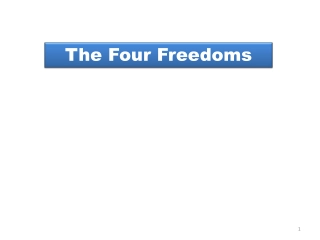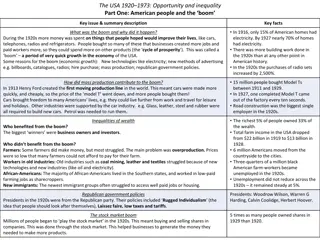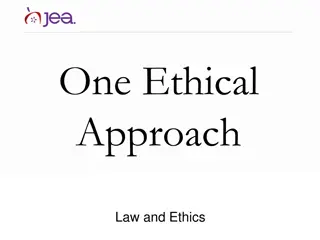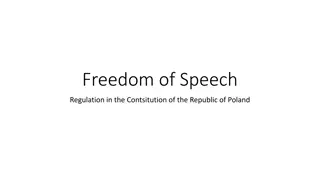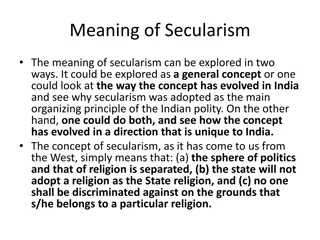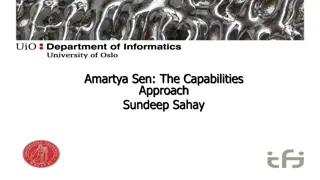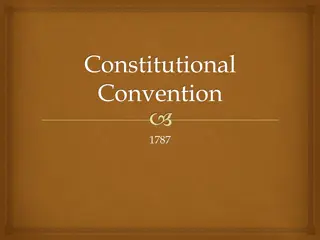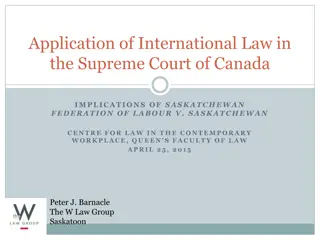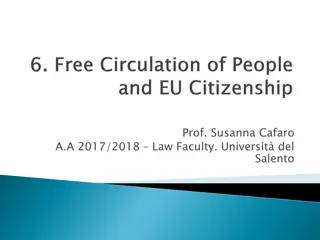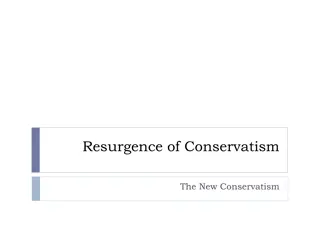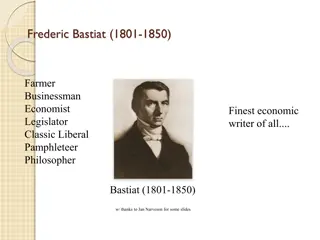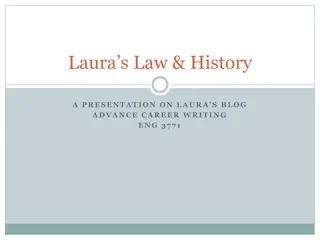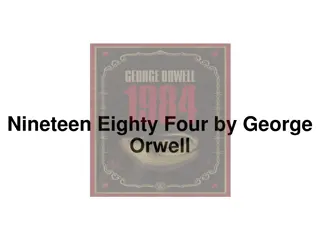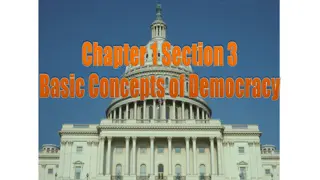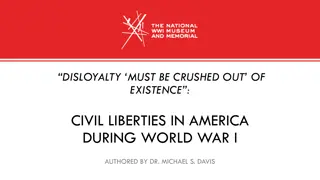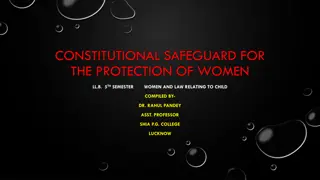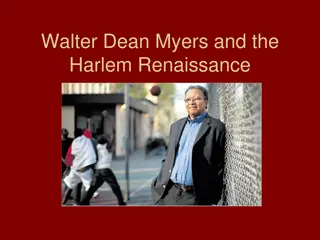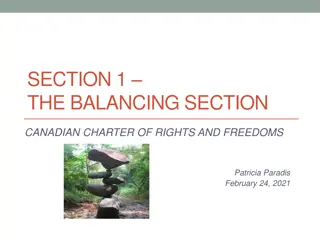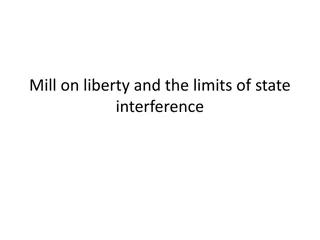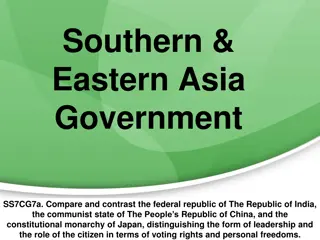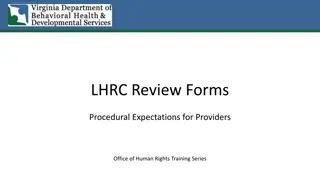The Four Freedoms
Delve into "The Four Freedoms" concept advocated by novelist1 and former US President Franklin D. Roosevelt, encapsulating freedom of speech and worship, and freedom from want and fear. This vision symbolizes the ideals of a democratic society and remains relevant in contemporary discussions on righ
0 views • 23 slides
Home and Community-Based Services Setting Rule for Waiver Providers
Explore the specific protections outlined in the HCBS Final Rule for waiver providers, emphasizing the goal of promoting individuals' rights, freedoms, and self-determination in Medicaid Home and Community-Based Services settings. Understand the requirements for full compliance and the importance of
0 views • 35 slides
Visitor from Outer Space: Choosing Five Rights
In the year 2025, a creature named Sthgir from planet Noitutitsnoc takes over America and gives citizens the option to keep only five rights out of a list. The citizens must unanimously decide on the rights to keep, leading to thought-provoking considerations about individual freedoms and societal i
0 views • 8 slides
Virginia's HCBS Training for Support Coordinators
Virginia's HCBS training for support coordinators aims to educate on the critical role of support coordination in achieving HCBS compliance. The training discusses the specific responsibilities and goals in aligning with the HCBS Final Rule to ensure individuals receiving services have equal rights,
0 views • 35 slides
Nazi Policies Towards Women: A Critical Analysis
Nazi policies towards women aimed to control and manipulate their roles in society, focusing on reducing women in the workforce, promoting Aryan reproduction, emphasizing purity and health, and encouraging Aryan marriage. These policies restricted women's freedoms and autonomy, enforcing strict guid
0 views • 11 slides
The USA 1920-1973: Opportunity and Inequality Part One
In the booming 1920s USA, technological advancements, mass production, and Republican policies led to economic growth, with a significant focus on consumer goods like cars, radios, and refrigerators. While the era saw a rise in prosperity for some, including business owners and investors, others, su
0 views • 6 slides
Freedom of Speech in Nomination Speech: Analysis and Insights
Exploring the boundaries of freedom of speech in a nomination speech for a student government candidate, highlighting elements that may not align with protected freedoms under the First Amendment. The speech emphasizes firm beliefs and dedication but raises questions about appropriateness and potent
0 views • 30 slides
Red Light vs. Green Light Ethics in Journalism: A Critical Analysis
Exploring the ethical nuances between Red Light and Green Light approaches in journalism ethics through real-life situations and expert insights. The debate between caution and courage, restrictions and freedoms, and the impact on journalistic practices and societal perceptions are examined in depth
0 views • 13 slides
Freedom of Speech Regulation in the Constitution of the Republic of Poland
The Constitution of the Republic of Poland guarantees freedom of speech and expression, ensuring the rights of individuals to hold opinions, seek, receive, and share information across various media. International agreements and laws further protect these rights, emphasizing the importance of respec
0 views • 7 slides
Evolution of Secularism: From Europe to India
Secularism, originating from the West, advocates for the separation of politics and religion, ensuring the state doesn't favor any religion while safeguarding individual rights. In Europe, religious wars prompted the adoption of toleration principles. The Enlightenment era in Europe paved the way fo
0 views • 5 slides
Essential Steps for Personal Data Breach Management
Detect, identify, and respond effectively to personal data breaches by containing the breach, assessing risks, notifying relevant authorities and affected individuals, and implementing measures to prevent future occurrences. Debunk common myths surrounding breach reporting and focus on mitigating ne
0 views • 5 slides
The Capabilities Approach by Amartya Sen: Understanding Development and Freedoms
Amartya Sen's Capabilities Approach focuses on expanding people's real freedoms and choices to enhance development. It prompts debates on inequality measurement, role of institutions, and more. Sen identifies five types of freedoms essential for development, emphasizing the intrinsic and instrumenta
0 views • 28 slides
Insights into Fahrenheit 451 by Ray Bradbury
Explore the influential novel Fahrenheit 451 by Ray Bradbury, delving into its origins, themes, and relevance in the context of societal criticism, dystopian elements, and historical backdrop of the 1950s. Discover the cautionary tale of censorship, technological advancements, and the impact of tota
0 views • 16 slides
Challenges and Progress in 1920s American Civil Rights Movement
The 1920s in America saw significant changes in civil rights, women's movement, and prohibition. Civil rights encompass personal freedoms guaranteed by the U.S. Constitution, including freedom of speech, voting rights, and protection from discrimination. Violations of civil rights have occurred thro
1 views • 42 slides
Meaningful Exploration: Analyzing Siddhartha and Gregor's Journeys
Explore the pursuit of meaning in the lives of Siddhartha and Gregor through a detailed analysis of their circumstances, actions, and resolutions. Learn how personal freedoms, societal expectations, and internal struggles shape their paths towards either demise or enlightenment.
0 views • 7 slides
The Constitutional Convention of 1787 and the Birth of the American Constitution
The Constitutional Convention of 1787 was convened to address the weaknesses of the Articles of Confederation and create a stronger central government. Delegates like George Washington, James Madison, and Alexander Hamilton played key roles in drafting the Constitution, which required ratification b
0 views • 5 slides
Examining the First Party System in APUSH
Explore the political landscape of the 1790s with the formation of the first party system in APUSH. Discover the key positions on federal vs. state power, economic and foreign policies, and the delicate balance between liberty and order that gave rise to Federalists and Democratic-Republicans. Unfol
0 views • 11 slides
Implications of International Law in the Supreme Court of Canada
This article discusses the application of international law in the interpretation of freedom of association in the context of the Charter of Rights and Freedoms in Canada. It explores the constitutional objections, the role of international law, relevant substance, and the common understanding of fr
0 views • 30 slides
Japanese Cultural Influence: Buddhism, Literature, and Arts
Exploring the intersections of Buddhism, literature, and the arts in Japan during the Heian period. Comparisons of Pure Land and Zen Buddhism, the significance of Heian as a city, and the flourishing of Japanese literature and art from the 800s to the 1100s. Delve into the roles and freedoms of wome
1 views • 4 slides
Empowering Youth in Rural Towns: A Path Towards Sustainable Development
Boosting the attractiveness of rural towns and the EU for the youth through the Youth&SPA project, focusing on engaging young people in shaping the future of small spa towns. Partners from Hungary, Italy, Serbia, Romania, and Slovenia collaborate in the Erasmus+ KA3 project to foster dialogue betwee
0 views • 14 slides
Evolution of the Single Market in the European Union
The creation of the Single Market within the European Union has its origins in the Treaty of Rome, aiming to ensure the free movement of goods, services, labor, and capital. This evolution involved the elimination of barriers, harmonization of rules, and the introduction of EU citizenship to enable
0 views • 17 slides
The Resurgence of Conservatism in America
The resurgence of conservatism in America has brought about a clear distinction between conservative and liberal ideologies. Conservatives emphasize limited government intervention, promoting free-market principles, individual liberty, and moral values. On the other hand, liberals advocate for gover
0 views • 14 slides
Comprehensive Guide to Livestock Animal Welfare During Health Emergencies
Ensuring the welfare of livestock animals during health emergencies is crucial. This comprehensive guide covers various aspects such as ethical responsibilities, the Five Freedoms framework, daily requirements for water and feed, ensuring freedom from discomfort and pain, allowing animals to express
0 views • 11 slides
Animal Welfare and Five Freedoms in Farming
Animal welfare encompasses physical and mental wellbeing, allowing animals to express natural behaviors. The Five Freedoms outline essential welfare needs, making sure animals are free from hunger, discomfort, pain, fear, and distress. The Farm Animal Welfare Council ensures these needs are met for
0 views • 16 slides
Animal Welfare in Poultry Farming: Ensuring Health and Well-being
Explore the essential aspects of animal welfare in poultry farming, focusing on promoting the physical and mental well-being of birds during health emergencies. Learn about ethical responsibilities, the Five Freedoms framework, and practical guidelines for ensuring freedom from hunger, discomfort, p
0 views • 11 slides
Insights from Frederic Bastiat on Law, Liberty, and Plunder
Frederic Bastiat, an eminent economist and philosopher, delves into the topic of law, its purpose, and the misuse of power in society. He critiques how laws can be perverted to serve individual greed and false philanthropy, leading to legal plunder. Bastiat emphasizes the importance of protecting ri
0 views • 23 slides
Laura's Law & History: Exploring the Connection Between Law and Historical Events
In Laura's blog "Laura's Law & History," she delves into the intricate relationship between law and historical events. Through engaging blog posts and a mission to spark curiosity in her readers, Laura aims to shed light on how past events shape our present freedoms. From discussing the workings of
0 views • 7 slides
Insights into George Orwell's Nineteen Eighty-Four and Totalitarian Regimes
George Orwell's novel Nineteen Eighty-Four explores themes of oppression, totalitarianism, and political satire inspired by the oppressive regimes of Nazi Germany and Soviet Russia. The story delves into a dystopian society controlled by the Party, led by figures like Big Brother, reflecting Orwell'
1 views • 25 slides
Key Principles of American Democracy and Social Contract Theory
The basic notions of American democracy emphasize fundamental worth, equality, majority rule with minority rights, compromise, and individual freedom. These principles can be upheld through a social contract, which may require individuals to fulfill obligations for the welfare of society. While equa
0 views • 9 slides
Promoting Solidarity and Rights of Workers Globally through International Trade Unions
Joining trade unions and engaging in international work is crucial for promoting solidarity, protecting workers' rights globally, and challenging exploitation by multinational companies. UNISON's National LGBT+ Committee is actively involved in international work, aiming to advocate for LGBT+ worker
0 views • 16 slides
Husbandry 101 - Ensuring the Welfare of Animals in Care
Our mission at Husbandry 101 is to maintain the highest standards of humane animal care by providing comfort, happiness, and health to the animals in our care. We prioritize the five basic freedoms for animals, follow facility-specific SOPs, have emergency procedures in place, and ensure new caregiv
0 views • 18 slides
Civil Liberties and Dissent in America: World War I and Beyond
Civil liberties in America during World War I were challenged as state and local governments suppressed anti-war sentiments, leading to the transformation of the Justice Department to counter-subversive actions. Organizations like the NCLB fought for freedom of expression, culminating in the creatio
0 views • 36 slides
ECJ Ruling on Cadbury-Schweppes CFC Rules
The European Court of Justice (ECJ) ruled in the Cadbury-Schweppes case that UK controlled foreign company (CFC) rules, aimed at preventing tax avoidance, cannot be applied to subsidiaries engaged in genuine economic activities. The case highlighted the conflict between freedom of movement of capita
0 views • 8 slides
Constitutional Safeguard for the Protection of Women in Indian Law
The Indian Constitution provides equality and empowerment for women through measures of positive discrimination. Gender equality is enshrined in the Preamble, Fundamental Rights, Fundamental Duties, and Directive Principles of the Constitution. Various provisions are designed for the benefit of wome
0 views • 11 slides
The Harlem Renaissance and Its Connection to the Great Migration
The Harlem Renaissance was a pivotal period of African American cultural flourishing, expressed through various art forms like paintings, music, dance, theater, and literature. This era coincided with the Great Migration, where economic opportunities in the North led to a mass movement of black Amer
0 views • 22 slides
Section 1 of the Canadian Charter of Rights and Freedoms
Exploring the history, purpose, and interpretation of Section 1 of the Canadian Charter of Rights and Freedoms. This section discusses the balancing act of limiting rights for societal well-being, notable events like the Hays-Joyal Joint Committee hearings, and perspectives from individuals like Ala
0 views • 47 slides
Mill on Liberty and State Interference: Principles and Limits
John Stuart Mill's work delves into the principles of civil and social liberty, addressing the limits of state interference on individual freedoms and the influence of societal pressures. He emphasizes the necessity of protecting against tyranny, including the tyranny of the majority, and the import
0 views • 23 slides
The Rise and Reign of Napoleon Bonaparte (1799-1815)
Napoleon Bonaparte's ascent to power from military general to Emperor of France during the Napoleonic Era marked by coups, reforms, and controversial coronation. His reign brought significant reforms to economy, society, and religion, focusing on economic stability, social order, religious freedoms,
0 views • 26 slides
Government Structures in India, China, and Japan
Comparing the government structures of India, China, and Japan reveals distinct differences in leadership forms, citizen roles, voting rights, and personal freedoms. India operates as a federal republic with a parliamentary system, China as a communist state, and Japan as a constitutional monarchy.
0 views • 37 slides
LHRC Review Forms and Procedural Expectations for Providers
The LHRC, as per regulations, reviews certain provider actions through standardized forms like Restrictions to Dignity and Freedoms, Next Friend, Behavioral Treatment Plan, Consent and Authorization, and more. The process involves documentation submission and review to ensure compliance and safeguar
0 views • 25 slides
